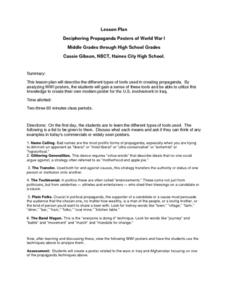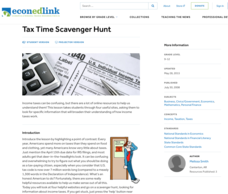Skyscraper Museum
Changes in a City Over Time
Investigate the growth and development of New York City with the final lesson in this four-part series on skyscrapers. Learners first explore the concept of urban growth by looking closely at a series of three paintings made of Wall...
Curated OER
Deciphering Propaganda Posters of World War I
What strategies are employed when creating propaganda? Your young historians will learn about six different techniques utilized in the construction of political propaganda, particularly in the advertisements of World War I. The...
iCivics
Wanted: A Just Right Government
What type of government did American colonists gain and seek after gaining their independence after the Revolutionary War? Here is lesson that will guide your young learners through the new nation's progression from the Articles of...
iCivics
Emphasize Minimize
Encourage your class members to consider what points they are really emphasizing when they are making an argument, whether in writing or in speech. Watch out though, as this lesson may just leave your learners eager to debate you!
University of the Desert
What Is Extremism?
By participating in discussions using prompts and statements provided in the lesson plan, learners identify the concept of extremism and consider what causes violent acts of extremism in the modern world.
George Washington's Mount Vernon Estate & Gardens
George Washington: Centerpiece of a Nation
A neat Presidents Day activity, this lesson provides a culminating learning experience for upper elementary aged learners. After analyzing George Washington's, "A Display of the United States of America," your learners will conduct...
Caucus 101
Linkage Institutions: Interest Groups: Option A
How are elections really run and won? Learn about special interest groups, super PACs, and lobbyists with an engaging activity about the caucus process. Young voters research specific interest groups and analyze their part in previous...
Peace Corps
Family
Family traditions are the focus of a instructional activity that explores the lives of children in India and those in your classroom. Scholars examine their own family roles and traditions, then respond to an informative text detailing a...
Peace Corps
Community
What is a community? Find out with a lesson that sheds light onto the different types of communities—school, local, and global. Scholars read informational text detailing the life of a young girl from Cape Verde and take part in a...
US Institute of Peace
Responding to Conflict: Negotiation—Identifying Wants and Needs
Let's make a deal! Are real negotiations as simple as they are in the game show? Scholars learn the art of negotiation during the 8th instructional activity in a series of 15. The activity kicks off with a fun group negotiation, then...
US Institute of Peace
Responding to Conflict: Mediation
What happens when two parties can't come to agreement? Scholars explore the role of a mediator through part 10 of a 15-part series of peacebuilding lessons. Through individual work and role play, pupils brainstorm solutions until they...
US Institute of Peace
Perspectives on Peace
Much like a garden, once the seeds of peace are planted, they need to be tended! How can humankind make and keep peace? The second installment in a series of 15 peacebuilding activities focuses on different perceptions of peace. The...
US Institute of Peace
Identifying Your Conflict Style
How do you handle conflict? Individuals look inward to determine their own conflict style through group discussion and a short quiz. The sixth installment in a series of 15 conflict management lessons examines how our feelings and...
Stanford University
Explosion of the Maine
An intriguing lesson features newspaper articles to help academics understand the political impact of the sinking the Maine and how the American media depicted the event. Scholars also view a presentation, participate in group...
Stanford University
Battle of the Somme
The Battle of the Somme was a conflict that raged on for months. Academics view a presentation and read text excerpts from newspaper articles to understand the events that turned the battle into a long conflict. The presentation also...
Facing History and Ourselves
Why Little Things Are Big
Often our decisions are impacted by a fear of how others see us. That's the big idea in a two-day lesson that asks how false assumptions, how our fear of how others may see us, impact how we act. After watching a video about such a...
Nemours KidsHealth
Peer Pressure: Grades 6-8
Middle schoolers practice techniques they can use to get safely out of uncomfortable situations involving peer pressure. One activity engages class members in role-playing two scenarios; the first modeling negative peer pressure, while...
Nemours KidsHealth
Getting Along: Grades 6-8
Three activities are designed to help middle schoolers develop the skills they need to get along with others, to develop tolerance and appreciation for similarities and differences, and to generate strategies for resolving conflicts. The...
Facing History and Ourselves
The Legacies of Reconstruction
The final instructional activity in the seven-resource Reconstruction Era collection examines the legacies of Reconstruction. Class members investigate why the period has been called an "unfinished revolution," "a splendid failure," and...
Greater Good Science Center
Thank You for Believing in Me
The fourth and final lesson in the Gratitude series has learners craft and deliver a Gratitude Letter to a significant person in their lives. Writers include information about how they benefitted from the attention of the benefactor, an...
Museum of the American Revolution
Leadership and Alexander Hamilton
Alexander Hamilton serves as a model in a lesson that asks young political scientists to consider the strengths and weaknesses of six different leadership styles. They read a brief overview of Hamilton's activities before, during, and...
Council for Economic Education
Tax Time Scavenger Hunt
Is a 1040EZ tax form really easy? Scholars investigate the complexities of the United States taxation system with an economics lesson. Using a wide variety of web sources, they interpret IRS taxation rules and regulations to better...
Stories on the Way
The Temptation of Jesus
Temptation is the focus of this lesson plan, which was designed for the first week of Lent as an introduction to the tradition of Lenten fast. It includes reading of biblical scripture, hands-on activities where learners design cards...
Global Oneness Project
Architectural Wonders
Angkor Wat, a UNESCO World Heritage Site located in Cambodia, is the focus of a lesson that asks class members to consider factors that could result in the destruction of these archeological treasures. Pupils listen to a lecture on the...
Other popular searches
- Esl Social Studies Lessons
- Social Studies Lessons Rome
- Social Studies Lessons Japan
- Social Studies Lessons on Maps

























